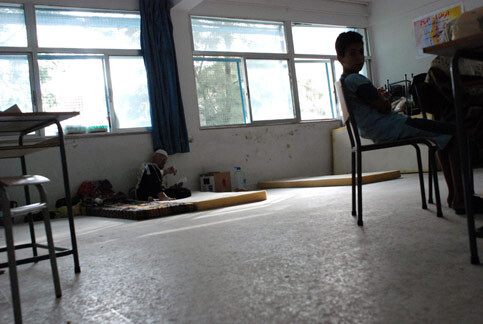Electronic Lebanon 4 June 2007

The fate of Nahr al-Bared’s displaced, like those staying in this UNRWA classroom in Baddaawi camp, remains in the air as UNRWA prepares a new “temporary refuge” for those who have fled the Lebanese army siege. (Tanya Traboulsi)
BADDAWI CAMP, Lebanon, Jun 4 (IPS) - Fighting escalated Sunday and Monday in Lebanon as the Sunni Islamic group Jund al-Asham attacked army positions outside Lebanon’s largest Palestinian refugee camp, Ain al-Hilweh, in the south.
Meanwhile, the top Palestinian leadership in Lebanon says it cannot guarantee it can control the reaction of the more than 400,000 Palestinians living in the 12 official refugee camps throughout the country if the Lebanese army’s all-out assault on the besieged Nahr al-Bared refugee camp in the north causes a heavy civilian death toll.
At the Fatah headquarters in the nearby Baddawi Palestinian refugee camp, Hajj Rif’at, media director for the mainstream Fatah organisation and a spokesperson for the multi-party Palestinian Liberation Organisation, told IPS, “If the army invades [Nahr al-Bared], I think that there will be many more Palestinian victims from within the camp, and we refuse that the solution be at the expense of our children and women and the destruction of our camp.”
What began in May as a security incident with bank robbers in the northern Lebanon coastal city of Tripoli has turned into a prolonged military confrontation with a Sunni Islamist group, Fatah al-Islam, that had taken root in Nahr al-Bared in the months directly after the 34-day war with Israel that began Jul. 12, 2006.
For two weeks, the Lebanese army has traded heavy gunfire with members of the group. Sources on the ground say that the army has also sent thousands of 155-millimetre tank shells and mortar rounds, into the refugee camp, to suppress any movement from the fighters of Fatah al-Islam.
The fighting intensified over the weekend as the Lebanese military sent in a newly acquired helicopter gunship to blast the upper floors of buildings used by Fatah al-Islam snipers. Observers say that the Lebanese army also captured strategic parts of Fatah al-Islam’s defensive positions that had been established on the outer rims of the Nahr al-Bared camp.
The Lebanese army claims to have killed dozens of Fatah al-Islam fighters over the last three days. Sources confirm that at least 12 Lebanese soldiers were killed and 10 wounded in the fighting over the weekend. Thus far, 40 army soldiers have been killed since fighting began on May 20.
The pro-Western government has vowed to defeat the militants at all cost, and analysts say that any room for negotiating with the Sunni Islamist group was lost after the first week of fighting. Indeed, Fatah al-Islam’s leadership has reiterated their willingness to fight to the last man, refusing to surrender or give up their arms at this stage.
“We cannot afford to bargain. We cannot compromise on the issue of terrorism,” Lebanese Prime Minister Fouad Siniora said late this week.
These tactics have caused a humanitarian crisis for the approximately 10,000 Palestinians still trapped in the Nahr al-Bared camp.
Information coming from the camp is limited. Residents who have been able to make phone calls from within the camp say that the Lebanese army has continued to pound the camp’s interior with artillery fire where most of the civilians are now located. This despite Lebanese government statements that all efforts would be made to spare civilians in their effort to crush Fatah al-Islam.
The Palestinian Red Crescent said at least 25 civilians have been killed in Nahr al-Bared since the Lebanese army surrounded the camp two weeks ago.
According to Mahmoud Rashid, an official at the Saffad Hospital in the Baddawi Camp, most if not all of the civilian deaths that have been recorded have come from the army shelling, and the number of dead is likely to rise significantly because there is no medicine in the camp to treat the wounded.
The International Committee for the Red Cross delivered 23 tonnes of food and nearly 60,000 litres of water on Tuesday and Wednesday last week, providing the first significant aid relief to the remaining Palestinians in the Nahr al-Bared camp who have been without electricity, food or water since the fighting began.
Abbas Zaki, the top PLO representative in Lebanon, said in a television interview on Wednesday, “There are corpses rotting in the streets.”
More than half of the estimated 35,000 residents of Nahr al-Bared have fled the fighting to the 11 other official Palestinian refugee camps in Lebanon.
At the Baddawi Palestinian refugee camp five kilometres from the northern coast city of Tripoli, more than 20,000 civilians have sought refuge in the last 13 days, doubling the camp’s size and overburdening its social services.
As the fighting continues around Nahr al-Bared, the anger on Baddawi’s streets is palpable.
Khaled Yamani, an official with the Popular Front for the Liberation of Palestine in Lebanon said, “Putting aside the issue of Fatah al-Islam and other similar groups, the anger is brewing amongst the Palestinians because it is their people who are being killed, and it’s not being taken into consideration, and this anger may even manifest itself outside the bounds of official Palestinian structures.”
Palestinians took to the streets over the weekend to protest the Lebanese army’s attacks on civilians trapped in Nahr al-Bared. Residents of the Bourj al-Barajneh camp in Beirut joined displaced families from Nahr al-Bared for a protest in front of the United Nations Relief and Works Agency’s medical centre there on Friday, and hundreds of Palestinians gathered near a Lebanese army outpost in the Rashidiyeh refugee camp in south Lebanon demanding an immediate cease-fire and end to “random” attacks on civilians.
“When will we be allowed to return to our homes? Is this a permanent resettlement?” Abu Ali, a father of seven, asked Thursday from an Internet cafe in the Baddawi camp. He and his entire family fled Nahr al-Bared to Baddawi on the third day of fighting.
In the course of several interviews, displaced families in the Baddawi camp were equating their flight from Nahr al-Bared to what Palestinians call Nakba, or the “cataclysm”, referring to the flight of some 700,000 Palestinians that coincided with the creation of the state of Israel in 1948.
Although Prime Minister Siniora has pledged to rebuild what has been destroyed by the Lebanese army over the last two weeks in the battle against Fatah al-Islam, few of the displaced in the Baddawi camp have put much stock in his statements.
Siniora’s pro-Western government has been locked in a protracted political battle with Hezbollah, a Shi’a organisation, and its allies since last year’s war with Israel. Reconstruction efforts needed after Israel’s military destruction of villages in south Lebanon have yet to begin, and are not expected to until the ongoing political crisis with Hezbollah reaches some sort of resolution.
This past weekend, Hezbollah leader Sayyed Hassan Nasrallah condemned Siniora’s government for bringing in military aid from the United States and their Arab allies. On Sunday, he said such assistance could provoke al-Qaeda style movements to begin fighting in Lebanon as they have done in Iraq.
On Sunday and Monday, the conflict heated up in southern Lebanon when another Sunni Islamic group, Jund al-Sham, attacked Lebanese army positions outside Ain al-Hilweh camp. Three Lebanese soldiers were killed, and although Palestinian groups in the camp have moved to contain this small Islamist movement from inflaming the situation, Lebanese army sources say the fighting continues.
Meanwhile, Palestinians in the camps in Lebanon are gathered around their television sets, or keeping close watch on news through their mobile phones and at Internet cafes, waiting to see what the body count will be for those civilians trapped inside the Nahr al-Bared camp.
That information might be slow in coming, as the Lebanese government has prevented journalists and humanitarian organisations from entering areas in and around the camp.
All rights reserved, IPS – Inter Press Service (2007). Total or partial publication, retransmission or sale forbidden.
Related Links





